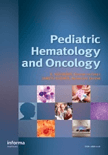
PEDIATRIC HEMATOLOGY AND ONCOLOGY
Scope & Guideline
Elevating standards in pediatric hematology and oncology.
Introduction
Aims and Scopes
- Pediatric Hematology:
Research on various hematological disorders affecting children, including anemia, sickle cell disease, and hemophilia, with an emphasis on pathophysiology, treatment modalities, and long-term outcomes. - Oncological Studies:
Focused studies on pediatric cancers, including leukemia, lymphoma, and solid tumors, exploring diagnosis, treatment strategies, clinical trials, and survivorship. - Transplantation and Cellular Therapies:
Investigation into hematopoietic stem cell transplantation and other cellular therapies as treatment options for pediatric patients with severe hematological malignancies. - Genetic and Molecular Research:
Studies examining the genetic underpinnings of pediatric diseases, including genetic disorders, cancer predisposition, and the role of molecular markers in treatment responses. - Supportive Care and Quality of Life:
Research addressing supportive care measures, psychosocial aspects, and quality of life outcomes for pediatric patients and their families throughout treatment and survivorship. - International Health and Disparities:
Exploration of the challenges and outcomes of pediatric hematology and oncology in low- and middle-income countries, focusing on access to care and treatment disparities.
Trending and Emerging
- Precision Medicine and Genetic Testing:
An increasing number of papers focus on the application of genetic testing and precision medicine approaches to tailor treatments for pediatric patients, indicating a significant trend towards personalized healthcare. - Impact of COVID-19 on Pediatric Patients:
Research examining the effects of the COVID-19 pandemic on pediatric hematology and oncology patients is on the rise, highlighting the need for understanding how global health crises affect care delivery and patient outcomes. - Innovative Supportive Care Strategies:
Emerging studies are focusing on supportive care interventions, including psychosocial support and palliative care, which are crucial for improving the quality of life for pediatric patients and their families. - Long-Term Outcomes and Survivorship:
There is a growing emphasis on the long-term health outcomes and survivorship issues faced by pediatric cancer survivors, reflecting a shift towards recognizing the importance of post-treatment quality of life. - International Collaborative Research:
An increase in multicenter and international studies indicates a trend towards collaborative research efforts, aiming to address global disparities in pediatric cancer care and outcomes.
Declining or Waning
- Traditional Chemotherapy Approaches:
There seems to be a decrease in studies focusing solely on conventional chemotherapy regimens, as newer targeted therapies and immunotherapies gain more attention in the treatment of pediatric cancers. - Single-Center Studies:
A noticeable decline in the publication of single-center studies suggests a shift towards multicenter collaborations that provide broader data and insights into treatment outcomes. - Basic Science and Laboratory Studies:
Research papers focusing on basic science and laboratory methodologies appear to be waning as clinical applications and translational research take precedence, highlighting a move towards practical and immediate clinical relevance.
Similar Journals
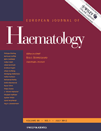
EUROPEAN JOURNAL OF HAEMATOLOGY
Pioneering Discoveries in Blood Disorders and TherapiesEUROPEAN JOURNAL OF HAEMATOLOGY, published by Wiley, serves as a vital resource for experts in the field of hematology, focusing on the latest advancements in blood disorders and therapies. With an ISSN of 0902-4441 and an E-ISSN of 1600-0609, this esteemed journal has been disseminating knowledge since 1986 and continues to thrive, converging its visionary approach through to 2024. Notably, it holds a distinguished Q2 ranking in Hematology and an impressive Q1 ranking in the broader category of Medicine (miscellaneous) as of 2023, highlighting its significant contribution to the scientific community. With a Scopus rank of #45/137 and a 67th percentile in the field, the journal is recognized for its rigorous peer-reviewed research, making it an indispensable publication for researchers, practitioners, and students aiming to stay at the forefront of hematological studies. Though not an open-access journal, it ensures broad accessibility to critical findings via its subscription model, thus fostering an informed and globally engaged audience.
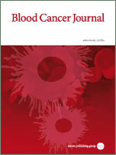
Blood Cancer Journal
Innovating research for a brighter future in blood cancer.Blood Cancer Journal, published by SPRINGERNATURE, is a leading open-access journal that has been at the forefront of hematology and oncology research since its inception in 2011. With an impressive impact factor and a commitment to disseminating high-quality research, it holds a prestigious Q1 ranking in both hematology and oncology categories as of 2023. The journal is dedicated to publishing innovative studies, comprehensive reviews, and insightful commentaries that advance our understanding of blood cancers, making it an essential resource for researchers, healthcare professionals, and students in the field. Its open-access model ensures that groundbreaking research is accessible to a global audience, promoting collaborative efforts to enhance treatment methodologies and patient outcomes. With a strong reputation illustrated by its Scopus rankings—8th in hematology and 30th in oncology—Blood Cancer Journal exemplifies excellence and leadership in the ever-evolving landscape of cancer research.
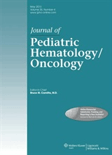
JOURNAL OF PEDIATRIC HEMATOLOGY ONCOLOGY
Bridging research and practice in pediatric hematology and oncology.JOURNAL OF PEDIATRIC HEMATOLOGY ONCOLOGY, published by Lippincott Williams & Wilkins, serves as a vital platform for the dissemination of cutting-edge research and insights in the fields of pediatric hematology and oncology. Since its inception in 1979, the journal has maintained a commitment to advancing knowledge through peer-reviewed articles that contribute to the understanding and treatment of blood disorders and cancers in children. With an impact factor reflective of its academic contributions, the journal is positioned in the Q3 quartile across key medical categories — Hematology, Oncology, and Pediatrics, Perinatology and Child Health — indicating its relevance and influence in the field. While it does not currently offer open access options, the journal remains a crucial resource for researchers, clinicians, and students dedicated to improving pediatric care and outcomes. Researchers are encouraged to contribute to this esteemed journal as it seeks to bridge the gap between clinical practice and research, fostering innovation and improved quality of life for young patients affected by hematologic and oncologic conditions.

ANNALS OF HEMATOLOGY
Empowering the scientific community with quality contributions.ANNALS OF HEMATOLOGY, published by Springer in Germany, stands as a premier platform for advancing knowledge in the field of hematology and medicine at large. With a significant impact factor and recognized rankings—Q2 in Hematology and Q1 in Medicine (miscellaneous) as of 2023—this journal is pivotal for researchers, clinicians, and students who are keen on exploring the latest developments in blood disorders, treatments, and innovative methodologies. Its broad scope encompasses original research, reviews, and discussions that aim to foster interdisciplinary dialogue, ensuring that the latest findings and theories are accessible to the scientific community. Although not an open-access journal, its rigorous peer-review process guarantees high-quality contributions, thereby solidifying its reputation as a vital resource in the hematological field. Founded in 1991, the ANNALS OF HEMATOLOGY continues to evolve, converging invaluable insights from both basic and clinical research until 2024. For those dedicated to improving patient outcomes and advancing hematological science, this journal remains an essential reference.
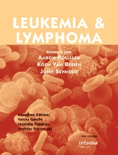
LEUKEMIA & LYMPHOMA
Bridging research and clinical practice in blood cancers.LEUKEMIA & LYMPHOMA is a prestigious peer-reviewed journal published by Taylor & Francis Ltd, focusing on vital research in the fields of hematology, oncology, and cancer research. With an ISSN of 1042-8194 and an E-ISSN of 1029-2403, this journal is recognized for its high-quality and impactful contributions to understanding blood cancers, with a notable impact factor reflective of its influence. Since its inception in 1989, LEUKEMIA & LYMPHOMA has continuously provided a platform for researchers and professionals to disseminate their findings, fostering advancements in diagnostic, therapeutic, and clinical strategies related to leukemias and lymphomas. The journal ranks in the Q2 category for both Hematology and Oncology research categories as of 2023, underscoring its commitment to excellence. The journal is based in the United Kingdom and serves a global audience, making it an essential resource for those dedicated to improving outcomes for patients with hematological malignancies.
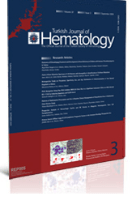
Turkish Journal of Hematology
Advancing hematological research for a healthier tomorrow.Turkish Journal of Hematology is an esteemed publication dedicated to advancing the field of hematology, producing influential research since its inception in 1999 under the auspices of GALENOS PUBL HOUSE. With an Open Access model, it facilitates widespread dissemination of knowledge, allowing researchers, clinicians, and students to stay abreast of the latest developments in blood disorders and treatments. With an ISSN of 1300-7777 and an E-ISSN of 1308-5263, the journal holds a commendable position in the academic community, evidenced by its 2023 Q3 ranking within the hematology category and its standing at #80 out of 137 in the Scopus database, placing it in the 41st percentile. Covering a wide scope of topics within hematology, this journal serves as a critical resource for disseminating innovative research and clinical practices pertinent to the ongoing challenges faced in this vital area of medicine. With its continuous publication until 2024, Turkish Journal of Hematology remains a beacon for enhancing the understanding and treatment of hematological conditions within the Turkish and global medical communities.
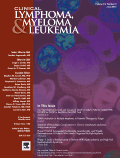
Clinical Lymphoma Myeloma & Leukemia
Transforming Cancer Care with Cutting-Edge ResearchClinical Lymphoma Myeloma & Leukemia is a prestigious journal dedicated to the study and treatment of hematologic malignancies, offering a vital platform for researchers and healthcare professionals in the fields of oncology, hematology, and cancer research. Published by CIG MEDIA GROUP, LP, this journal has established itself as a crucial resource since its inception in 2010, with a continuous commitment to disseminating knowledge until at least 2024. With an impact factor that objectively reflects its influence, it is rated in Q3 quartiles in both Cancer Research and Hematology as well as in Oncology as of 2023. Researchers can access a wealth of articles and studies that explore various dimensions of lymphoma, myeloma, and leukemia, thus fostering an environment of collaboration and innovation. Although it currently does not offer full open access, its extensive archive and rigorous peer-review process ensure the publication of high-quality research, making it an essential resource for anyone dedicated to advancing the science and practice of treating blood cancers.

Journal of Hematology
Connecting Scholars, Enhancing PracticeThe Journal of Hematology, published by ELMER PRESS INC, serves as a pivotal platform for disseminating cutting-edge research in the field of hematology. With an ISSN of 1927-1212 and an E-ISSN of 1927-1220, this journal is committed to advancing scientific knowledge and clinical practice through high-quality peer-reviewed articles encompassing all aspects of blood disorders, from basic science to health policy implications. While the journal currently operates under a traditional access model, it nonetheless prioritizes the rapid publication of significant findings, ensuring that researchers, clinicians, and students have timely access to the latest advancements in hematological research. Positioned to bridge gaps in knowledge and foster collaboration among scholars worldwide, the Journal of Hematology is an essential resource for anyone invested in this vital area of medicine.
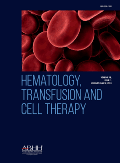
Hematology Transfusion and Cell Therapy
Transforming research into clinical practice.Hematology Transfusion and Cell Therapy, published by Elsevier, is a leading Open Access journal dedicated to advancing the fields of hematology, immunology, and transfusion medicine. Since its establishment in 2018, this journal has provided a vital platform for sharing innovative research and clinical advancements in the management of blood disorders and cellular therapies. Based in Brazil, it attracts a global audience, facilitating access to high-quality research that influences clinical practice and policy. With a current impact factor that places it in the Q3 category for both hematology and immunology as of 2023, the journal is recognized for its rigorous peer-review process and commitment to disseminating significant findings. By featuring a diverse range of articles, from original research to reviews, Hematology Transfusion and Cell Therapy aims to foster collaboration and knowledge sharing among researchers, professionals, and students alike, empowering them to tackle emerging challenges in their fields.

Journal of Hematology & Oncology
Catalyzing Breakthroughs in Blood Health and Cancer CareJournal of Hematology & Oncology, published by BMC, is a leading open-access journal dedicated to the dynamic fields of hematology and oncology, with a continuous publication record since 2008. Based in the United Kingdom, this prestigious journal provides a platform for groundbreaking research, encompassing topics that span cancer research, hematological disorders, and molecular biology. With a remarkable Q1 ranking in multiple categories including Cancer Research, Hematology, Molecular Biology, and Oncology for 2023, it stands as a significant contributor to the scientific community. The journal's rigorous peer-review process ensures the dissemination of high-quality studies that drive advancements in these critical areas of medicine, boasting an impressive Scopus rank in the top echelons of its fields. As an open-access publication, it promotes widespread accessibility and sharing of knowledge, making it an indispensable resource for researchers, clinicians, and students striving to make advancements in understanding and treating hematological and oncological diseases.